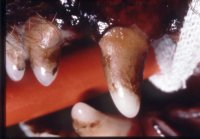
WHY YOU SHOULD BRUSH
YOUR PETS TEETH DAILY
|
This information is provided by Provet for educational purposes only.
You should seek the advice of your
veterinarian if your pet is ill as only he or she can correctly advise on the
diagnosis and recommend the treatment that is most appropriate for your pet.
Description
Human dentists are united in telling us about the importance
of daily brushing of teeth to prevent dental disease and, in particular
premature dental decay. One of the commonest forms of dental disease in humans
(caries) is not very common in cats or dogs - unless they are regularly fed
sweet treats such as chocolate. However, periodontal disease is very common.
The signs of this disease are :
- Bad smelling breath (halitosis)
- Build up of plaque and brown mineralised tartar (calculus) on the teeth
- Inflammation of the gums
- Ulceration of the gums
- Bleeding from the gums
- Pus around the base of the teeth
- Receding of the gum away from the teeth
- Loose teeth
- Loss of teeth
- Pain during eating - even reluctance to eat
On this photograph of an anaesthetised dog about to be treated for it's dental disease (you can see an orange tube in it's airway) a build up of tartar, receding gums, ulceration and bleeding from the gums, and white pus around the base of the teeth can be seen.
Complications of periodontal disease include spread of the bacterial infection in the mouth to other parts of the body. Spread of infection to the heart (called endocarditis) is a very serious, potentially-fatal complication. So, it is important to try to prevent this disease.
Regular brushing reduces the build up of bacterial plaque and mineral deposit on the teeth, and so reduces the likelihood of periodontal disease developing. Once the disease is present regular brushing helps to slow down the progression of the disease.
Specially designed tooth brushes and pet tooth paste have been developed by veterinarians and pet owners are surprised at how easy they are to use.

Other prophylactic methods to prevent dental disease include feeding rations with a high fibrous content - the fibres in the food act like flossing agents during eating, and keep the teeth clean.
For more information about regular dental prophylaxis ask your veterinarian.
Updated October 2013
